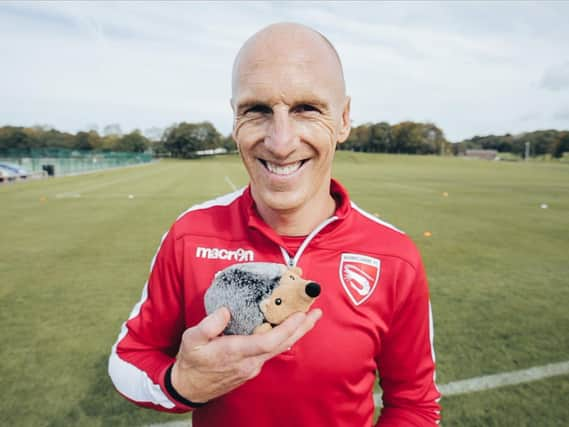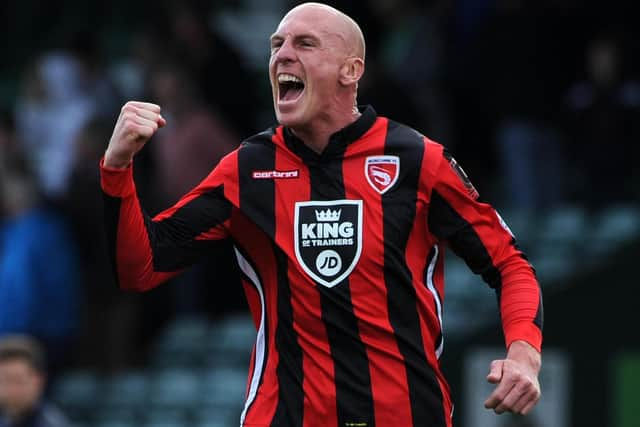Stalwart football professional Kevin Ellison hoping to help other players with mental health issues


On the pitch he was a big, horrible, bald-headed Scouser, and to his opponents Kevin Ellison was a tough, unflinching rival.
In the dressing room he was a larger than life character, a prankster and a joker, but he became an actor through his depression.
At Morecambe, he wore that mask for 10 long years.


Advertisement
Hide AdAdvertisement
Hide AdIt was his way of covering up his insecurities, fears and the internal struggles going on in his life.
His only medication was when he stepped over that white line to play football every Saturday.
That was his way of forgetting about all his issues and problems and from his time spent as Premier League player to his years in League Two.
Sadly , according to Ellison, there will be players who are not able to talk about their mental well-being.
Advertisement
Hide AdAdvertisement
Hide Ad“I’ve seen them, talked to them, hugged them and cried with them,” said Ellison, who was this released by the Shrimps after spending nine years at the Globe Arena.
“I’ve witnessed the other side too, players who have retired and lost the structure of their lives through drink, drugs and gambling.
I didn’t want to go down that road and that’s why I reached out to the Professional Footballers’ Association for help.
“It was so hard to make that call, but it was a massive relief to unburden myself.
Advertisement
Hide AdAdvertisement
Hide Ad“I get judged every time I play football, but this was a different type of judgement and I’m very grateful to my union. But through Gordon Taylor, Simon Barker and the wonderful staff at the
PFA they made sure I received proper help and care.
“Talking to a counsellor about my anxieties and depression, I came through my darkest hour and I learned new coping mechanisms.
“Maybe if I had spoken about how devastating it was, I’d never have reached the situation I found myself in for half of my career.
“Now I want to help others and via a counselling course, which I have been studying separately through the PFA, one day I will be able to be actively involved with people who are struggling with poor mental health.”
Advertisement
Hide AdAdvertisement
Hide AdEllison believes his own struggles means he in the perfect situation to help others.
“Because of what has happened to me I have a passion for helping other people,” he said. “There’s still a massive stigma surrounding mental health in football and I was 38 before I spoke out.
“But when I did, I got a massive response from my fellow professionals.”
Having struggled with mental health for much of his life, why did it take him so long to speak out?
Advertisement
Hide AdAdvertisement
Hide Ad“Football can be a very unforgiving and brutal environment to be in.
“Once, at another club, I was out injured.
“The manager walked past me and said: ‘You’re no use to me like that – you are deadwood.’
“It was bad enough being injured, but I thought is that what you really think of people.
“Even today, if a player went into a manager’s office somewhere and said: ‘Gaffer, my head’s not right,’ then I think that they would see it as a sign of weakness.
Advertisement
Hide AdAdvertisement
Hide Ad“It could be held against him, and it creates a dilemma for the manager: whether he picks somebody for a big game or awards a new contract.
“The manager needs three points on a Saturday, but surely it is in a club’s interest to help that player get better and I don’t think the football hierarchy grasp that.” Ellison revealed that for large parts of his career he has to control deep-rooted feelings of anger within his psyche.
“Before I contacted the PFA I attended anger management classes,” he said.
“There were people there from all backgrounds, including hard, amateur boxers and cage fighters, all struggling with mental health issues.
Advertisement
Hide AdAdvertisement
Hide Ad“I didn’t understand what I was going through then, that I was depressed.
“I called it my ‘dark cloud time’. I was angry and snappy with the kids and shouted about inconsequential stuff.
“My moods were like a light switch flicking on and off and that was hard on my family to understand.
“One of the PFA counsellors suggested I meditate and do yoga.
Advertisement
Hide AdAdvertisement
Hide Ad“The Professional Footballers’ Association also gave me free access to a meditation App called Headspace.
“I know that hundreds of players contacted them during the coronavirus lockdown wanting to access it.
“The meditation is aimed to make you a better human being and it has helped me become a kinder dad to my children because it has brought me some peace.
“If I don’t meditate regularly then I don’t feel as healthy as I’m not able to process my thoughts as well.
Advertisement
Hide AdAdvertisement
Hide Ad“Our world is an angry place, and each day I try to be a better person than I was yesterday.
“If you are player struggling with anxiety or depression, please don’t hesitate to contact the Professional Footballer’s Association because when I did it changed my life.”
Meanwhile, Ellison will draw a line under his career at Morecambe this week.
The English Football League’s second oldest player joined the Shrimps in 2011 and has served nearly a decade with the Lancashire club.
Advertisement
Hide AdAdvertisement
Hide AdIt means the end of an era for the 41-year-old veteran who said: “I’ll be very sad to say my goodbyes, but I do accept my time at Morecambe is at an end.
“I’m not part of the manager’s plans, but I’ll never forget the great friends I’ve made and the Shrimps’ supporters who were magnificent.
“They would sing: ‘Ellison, Ellison. He’s got no hair, we don’t care. I loved it, but I knew in January that I wouldn’t be at Morecambe and that the door had closed.
“I just wish people there had spoken to me properly, and I could have tried to plan for my future earlier.”
Advertisement
Hide AdAdvertisement
Hide AdHe added: “You’re lucky if you get ten years as a professional, and my expectation was to live the dream until I was 31 – but here I am ten years later.
“I’ve still a lot to offer football because I feel as fit now as I did was when I was 25.
“I’m capable of playing in this division, or maybe a little further down the football ladder.
“Hopefully, somebody will give me a chance.
“If not, then I’ll go back to the real world and try and get a job because I’ve two children to provide for.
“Finances will be tight, but it doesn’t scare me.
Advertisement
Hide AdAdvertisement
Hide Ad“I’ve done it before, working on a building site in winter and driving a van, delivering beds and three-piece suites in Liverpool.”
Signed on a one-year deal by former boss Jim Bentley, Ellison, who had spells in non-league with Chorley and Southport, has represented 15 clubs.
“I had half my career at Morecambe and was leading goal-scorer for several of those campaigns, so I’m incredibly proud of that.
“For the last couple of years, though, I’ve realised how grateful I am for my career.
Advertisement
Hide AdAdvertisement
Hide Ad“Before Morecambe, I’d been here and there and done okay, but to be still playing at 41 is a big achievement.”
Ellison was released by Liverpool’s Academy when he was 14 - but he never gave up on the dream of a professional career.
He recalled: “I opened that letter before setting off for school and it broke my heart.
“It was like good luck in the future Kevin, you’re not good enough. I’ve always taken the side of the underdog in life and it spurred me on to try even harder.
Advertisement
Hide AdAdvertisement
Hide Ad“Steven Gerrard and Michael Owen were a couple of years behind me at Liverpool, but to see how they were at that age, with such a special talent and how dedicated they were, was incredible to see.
“I see some kids in League Two, many who have gone through the Academy ranks, and they haven’t the hunger or desire to succeed.
“Academies have excellent facilities, but it is an unrealistic environment.
“Some of them are too keen on posting pictures of their £60,000 cars on social media and saying that they once played at Liverpool or Manchester City.
Advertisement
Hide AdAdvertisement
Hide Ad“Their fire has gone out – they are not good enough – because they’ve had it all too soon.”
“I was playing pub and park football at 15, sometimes three or four times a weekend, and you need to have that strong desire to survive because football is a horrible dog eat dog environment.”